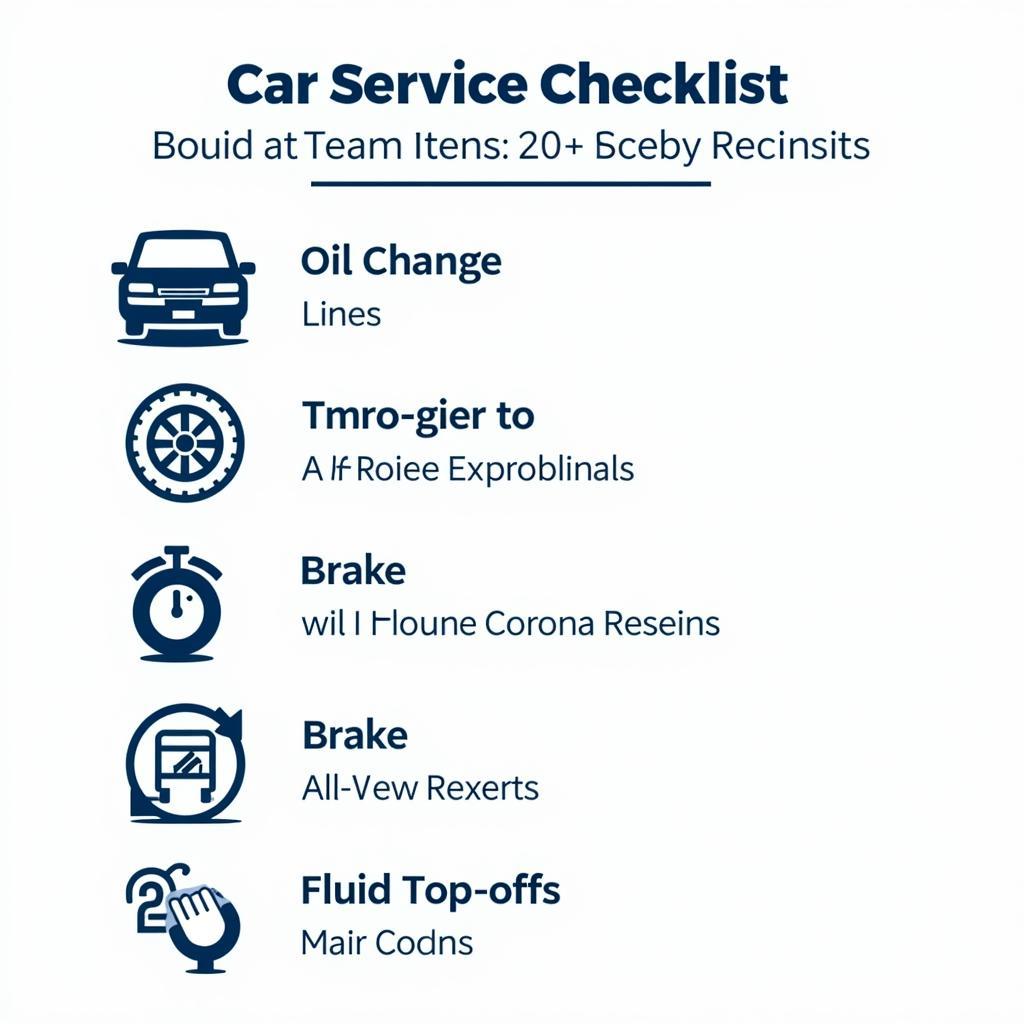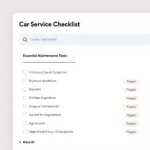Car service. It’s one of those things we all know we need, but knowing where to start, what to ask for, and how to make sure you’re getting the best value can feel like navigating a maze. This guide is designed to equip you with the car service basics, demystifying the process and empowering you to make informed decisions about your vehicle’s maintenance.
What are the Different Types of Car Services?
Not all car services are created equal. Understanding the different types is crucial for ensuring your vehicle receives the appropriate care at each stage of its life. Here are the most common car service categories:
1. Routine Maintenance
Think of this as your car’s regular check-up. Routine maintenance services are scheduled based on mileage or time intervals (usually every 3,000-5,000 miles or 3-6 months) and are designed to keep your car running smoothly and prevent potential problems.
Key routine maintenance services include:
- Oil and filter change: The lifeblood of your engine, regular oil changes are non-negotiable.
- Tire rotation and pressure check: Ensures even tire wear and optimal fuel efficiency.
- Brake inspection: Safety first! Regular checks keep your stopping power in top form.
- Fluid top-ups: From coolant to transmission fluid, these fluids keep your car running cool and performing at its best.
2. Manufacturer Recommended Service
Remember that handy owner’s manual that came with your car? Inside, you’ll find a manufacturer recommended service schedule tailored specifically to your vehicle’s make and model. Following this schedule is crucial, not only for maintaining your car’s health but also for preserving its warranty.
Manufacturer recommended services often cover:
- Timing belt replacement: A critical engine component that needs attention at specific intervals.
- Spark plug replacement: Keeps your engine firing smoothly and efficiently.
- Air filter replacement: Clean air is crucial for optimal engine performance.
- Cabin air filter replacement: Provides you with clean, breathable air inside your car.
3. Repair Services
These are the services you need when something goes wrong. From a flat tire to engine trouble, repair services address specific issues impacting your vehicle’s functionality and safety.
Common car repair services:
- Engine repair: From minor fixes to major overhauls.
- Transmission repair: Keeps your gears shifting smoothly.
- Brake repair: Ensures your safety and responsiveness on the road.
- Electrical system repair: Keeps everything from your lights to your radio working.
- Suspension and steering repair: Impacts your car’s handling and ride quality.
Why is Regular Car Service Important?
Imagine skipping your annual health check-up for years. Sounds risky, right? The same principle applies to your car. Regular car service is not just about keeping things running smoothly; it’s an investment in:
- Safety: Well-maintained vehicles are safer vehicles, plain and simple.
- Reliability: Regular service reduces the likelihood of unexpected breakdowns and costly repairs.
- Longevity: Proper care extends the lifespan of your vehicle, giving you more miles for your money.
- Resale Value: A well-maintained car with a comprehensive service history commands a higher resale value.
Tips for Choosing a Car Service Provider
Finding a trustworthy and reliable car service provider can be daunting. Here are some key factors to consider:
- Reputation: Look for shops with positive online reviews and a solid track record in your community.
- Expertise: Ensure the technicians are ASE-certified or have equivalent qualifications, especially if your car requires specialized work.
- Transparency: Choose a shop that clearly communicates service costs, provides detailed invoices, and answers your questions honestly.
- Convenience: Consider factors like location, hours of operation, and whether they offer shuttle services or loaner cars.
Empowering Yourself: Car Service Questions to Ask
Knowledge is power! Don’t hesitate to ask your service provider questions about your car’s needs. Here’s a starting point:
- What type of oil do you use?
- Are the parts you’re using OEM (Original Equipment Manufacturer) or aftermarket?
- Can you explain the repairs you’re recommending?
- What is the warranty on the parts and labor?
- Do you have experience working on my car’s make and model?
Conclusion
Car service doesn’t have to be a black box of mystery. By understanding the basics, choosing the right service provider, and asking the right questions, you can ensure your vehicle stays safe, reliable, and on the road for years to come. Remember, a little car care goes a long way!
FAQs
-
How often should I get an oil change? Consult your owner’s manual for specific recommendations, but generally, every 3,000-5,000 miles or 3-6 months is a good rule of thumb.
-
What does “check engine” light mean? It could indicate anything from a loose gas cap to a serious engine problem. Get it diagnosed by a professional ASAP.
-
How do I know if my brakes need replacing? Squealing, grinding, or vibrating brakes, as well as a spongy brake pedal, are all signs you should get your brakes checked immediately.
-
Is it necessary to use premium gas? Refer to your owner’s manual. Some cars require it for optimal performance, while others run fine on regular.
-
How can I improve my car’s fuel efficiency? Ensure proper tire pressure, drive at a consistent speed, avoid hard acceleration and braking, and keep up with routine maintenance.
Need assistance with your car service needs? Contact us via WhatsApp: +1(641)206-8880 or email us at [email protected]. Our dedicated team is available 24/7 to assist you.



